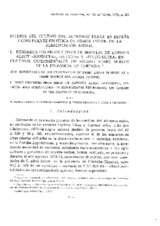Mostrar el registro sencillo del ítem
Interés del cultivo del altramuz dulce en España como fuente proteica de primer orden en la alimentación animal. I. Rendimientos productivos de semillas de Lupinus albus “Maxilupa”, “Beticus” y “Pflug-ultra” en cultivos experimentales en secano sobre suelos de la provincia de Córdoba
| dc.contributor.author | Conrado Martínez, M. | es_ES |
| dc.contributor.author | Pérez Cuesta, Manuel | es_ES |
| dc.contributor.author | Jodral Gutiérrez, A. | es_ES |
| dc.contributor.author | Tirado Serrano, J. | es_ES |
| dc.date.accessioned | 2010-04-15T09:55:23Z | |
| dc.date.available | 2010-04-15T09:55:23Z | |
| dc.date.issued | 1975 | |
| dc.identifier.issn | 1885-4494 | |
| dc.identifier.uri | http://hdl.handle.net/10396/2985 | |
| dc.description.abstract | In the province of Cordoba (Spain) three sweet varieties of Lupinus albus (“Maxilupa”, “Beticus” and “Pflug-Ultra”) have been investigated using the dry-farming process during the agricultural year 1973-74. Three experimental plots were established in the locality of Villaviciosa, were the ground is granitic, and were planted with the “Maxilupa” variety. The three afore-mentioned varieties were also planted in three further experimental plots in the locality of Villarrubia where the soil is granitic-argillaceous. The investigation comprises the compilation of meteorological data, mechano-chemical analysis of the soil, yields produced and chemical composition of the three varieties of seeds obtained in the cultivation. The richness in protein of the lupin and the favourable yields which have been produced, especially in the “Maxilupa” and “Beticus” varieties, in spite of the attacks suffered by some plants from nematodes, in-sects and fungi, constitute a strong stimulus for the authors to continue their investigations in wider areas of the province of Cordoba (Spain) in the nex agricultural year 1974-75. | en |
| dc.description.abstract | En la provincia de Córdoba (España) y durante el año agrícola 1973-74, se ha investigado el cultivo en secano de tres variedades dulces de Lupinus albus (“Maxilupa”, “Beticus” y “Pflug-Ultra”). Se establecieron tres parcelas experimentales en la localidad de Villaviciosa, cuyos suelos son de naturaleza granítica, que fueron sembrados con la variedad «Maxilupa”; y otras tres parcelas en la localidad de Villarrubia, que posee suelos granito-arcillosos, donde se sembraron las tres variedades citadas. El trabajo recoge datos pertenecientes a meteorología, análisis mecánico-químico de los suelos y rendimientos productivos y composición química de las tres variedades de semillas obtenidas en los cultivos. La riqueza proteína de las semillas del altramuz y los rendimientos favorables que han aportado las mismas, especialmente las variedades “Maxilupa” y “Betieus”, no obstante los ataques que sufrieron algunas plantas, par parte de nematodos, insectos y bongos, constituyen tan fuerte estimulo, para los autores, de proseguir, con firme esperanza, sus investigaciones en áreas mas amplias de la provincia de Córdoba, en el próximo año agrícola 1974-75. | es_ES |
| dc.format.mimetype | application/pdf | es_ES |
| dc.language.iso | spa | es_ES |
| dc.publisher | Universidad de Córdoba, Servicio de Publicaciones | es_ES |
| dc.rights | https://creativecommons.org/licenses/by-nc-nd/4.0/ | es_ES |
| dc.source | Archivos de zootecnia 24 (95), 211-232 (1975) | es_ES |
| dc.subject | Cultivos experimentales | es_ES |
| dc.subject | Altramuz dulce | es_ES |
| dc.title | Interés del cultivo del altramuz dulce en España como fuente proteica de primer orden en la alimentación animal. I. Rendimientos productivos de semillas de Lupinus albus “Maxilupa”, “Beticus” y “Pflug-ultra” en cultivos experimentales en secano sobre suelos de la provincia de Córdoba | es_ES |
| dc.title.alternative | The importance of the cultivation of sweet lupins in Spain as a prime source for animal feeding. I. Yield produced from seeds of Lupinus albus “Maxilupa”, “Beticus” and “Pflug-ultra” in experimental dry-farming on terrain in the province of Córdoba | en |
| dc.type | info:eu-repo/semantics/article | es_ES |
| dc.relation.publisherversion | http://www.uco.es/organiza/servicios/publica/az/az.htm | es_ES |
| dc.rights.accessRights | info:eu-repo/semantics/openAccess | es_ES |

